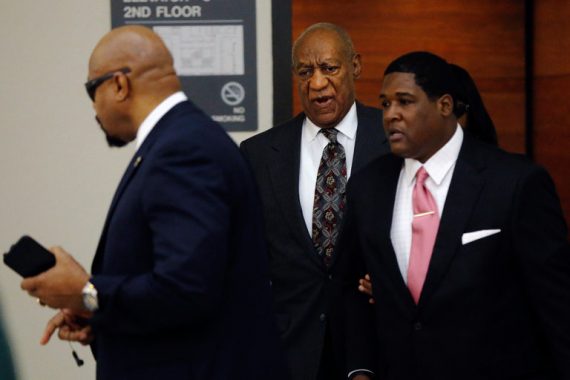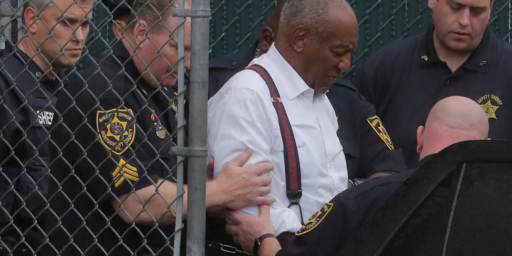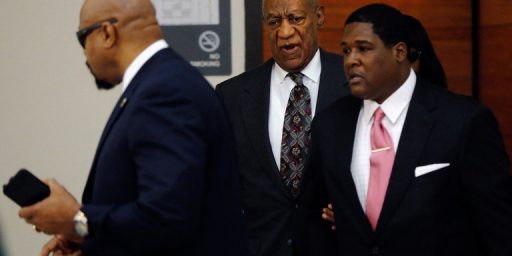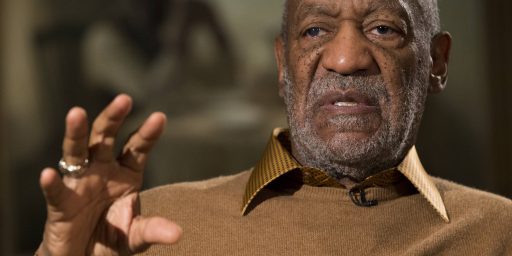Bill Cosby Heads Back For A Second Sexual Assault Trial, With Some Major Differences
Bill Cosby heads back to court for a retrial on the sexual assault allegations against him but it's not going to be the same as the first.
Less than a year after his first trial ended in a mistrial thanks to a hung jury, comedian Bill Cosby heads back to Court in suburban Philadelphia this morning for the beginning of round two of the sexual assault charges that have been pending lodged by a woman named Andrea Constand, who contends that Cosby drugged her and forced her to have sexual relations more than a dozen years ago. For several reasons, this trial promises to be very different for both the prosecution and the defense:
When it begins Monday, Bill Cosby’s retrial on sexual assault charges will appear very similar in some respects to the first trial that ended inconclusively nearly ten months ago with a deadlocked jury. The courthouse in Norristown, Pa., will be the same. Andrea Constand, 44, will take the stand again to give her account of an encounter at Mr. Cosby’s home outside Philadelphia in 2004 that turned, she said, into a drugging and an act of sexual molestation. Mr. Cosby’s defense will still center on the argument that this was a consensual act.
But much else about this second trial will be different, starting with how the prosecution will present its case.
At the first trial, one other woman who said she was also drugged and assaulted by Mr. Cosby, 80, was allowed to testify in addition to Ms. Constand. This time, Judge Steven T. O’Neill of the Montgomery County Court of Common Pleas is allowing prosecutors to present the accounts of five additional women with similar accusations.
One of those accusers is scheduled to be Janice Dickinson, the onetime supermodel, who said Mr. Cosby had drugged and raped her in a Lake Tahoe hotel room in 1982. (She has also sued Mr. Cosby for defamation.) The four other so-called “prior bad acts” witnesses were, at the time, aspiring actresses or models, and in one case a bartender, who say they were assaulted by Mr. Cosby between 1982 and 1989, all incidents he denies occurred.
Judge O’Neill has not said why he has allowed more accusers this time around. But experts say the additional accusations will help bolster Ms. Constand’s credibility as just one of a line of women who say Mr. Cosby abused them. She is the only woman whose complaint has resulted in criminal charges against the entertainer.
The admission of additional testimony by accusers whose claims against Cosby occurred far too long ago to be the subject of viable criminal or civil claims at this point due to the expiration of the applicable statutes of limitation is a controversial one that mirrors an issue that frequently comes up in criminal trials. As a general rule, courts limit the ability of the prosecution to introduce evidence of what are called “prior bad acts” due to the concern that allowing a jury to hear evidence of charges unrelated to the one before them could cause them to unfairly consider the Defendant’s guilt or innocence based on evidence unrelated to the case before them. Broadly speaking, such evidence or testimony is barred unless it falls within some very limited exceptions.
One of the exceptions, and likely the one that Judge O’Neill relied upon in making his decision, is the idea that such evidence can be admitted if it can be shown that the crime for which the Defendant stands accused is part of a pattern of previous conduct. In this case, the pattern that Cosby allegedly has consisted of enticing women to have sex with him by drugging and generally incapacitating them to the point where the “consent” that they give to him is essentially meaningless because they aren’t really conscious of their actions or even what’s happening to them. For Cosby, this is a pattern which, if the dozens of accusations against him are to be believed, stretch back to the 1960s when he was just becoming famous through his comedy albums, television appearances, and a co-starring role on I Spy. Because of that long-standing pattern, Judge O’Neill no doubt decided that additional evidence of prior bad acts of a similar nature to what Ms. Constand is alleging would be relevant to the jury.
While this is an obvious win for the prosecution, it also poses a danger for the reasons noted above. If Cosby is convicted this time, his defense will no doubt argue on appeal that admission of this additional evidence of prior bad acts was prejudicial and that it caused the jury to either ignore or dismiss some of the inconsistencies in the testimony of Ms. Constand that, under ordinary circumstances, should have been grounds for the kind of reasonable doubt that would have resulted in either acquittal or another hung jury. If they are successful in such an appeal, that would likely result in the prosecution would have to decide whether to go for a third trial against Cosby notwithstanding his advanced age and the fact that a reversal based on the inclusion of prejudicial prior bad acts testimony would lead the trial judge in such a case to be far more conservative in allowing such testimony again.
In addition to these differences, there will also be some differences on the defense side. This time, Cosby will be represented a new legal team led by Thomas Mesereau, a high-profile criminal defense attorney who is perhaps best remembered as the man who won an acquittal for Michael Jackson in his 2005 trial on charges of child molestation. It seems apparent that Mesereau will follow a far different strategy from Cosby’s first legal team. At least part of that strategy will include calling three witnesses who did not testify in the first trial, including one woman formerly affiliated with Temple University when Constand worked there who is expected to testify about conversations she had where Constand said she could make money by making false claims that a famous person had sexually assaulted her. Additionally, the jury will be drawn locally rather than brought in from another jurisdiction. Given Cosby’s ties to the Philadelphia area, this could prove to be significant.
Another major difference, of course, is the fact that Cosby’s retrial will be taking place in the shadow of the #MeToo movement, which has impacted every area of American life from entertainment and business to politics:
Perhaps nothing is as different from one trial to the next as the atmosphere in which it is unfolding. The Cosby case will be the first high-profile sex abuse trial to test what effect, if any, the #MeToo movement has on jurors.
Some experts think it may give jurors a greater willingness to believe people who come forward with accusations of sexual assault.
At least one juror in the first trial reported some problems with Ms. Constand’s credibility and had a question about why the many women who accused Mr. Cosby did not come forward sooner.
The entertainer’s lawyers, however, say they are worried that the barrage of publicity surrounding other bad-behaving men will lead jurors to lump Mr. Cosby in with the others, making it tougher for him to receive a fair trial.
For these and several other reasons, this trial is expected to last longer than the first one did. Whether it leads to a similar outcome or something more decisive is something only time will tell.





Cosby should die in prison.
I still would have a hard time on this jury. Most likely these awful things were done, but without hard evidence, and time that has past, I feel with only the things I have heard so far, I could not send this man to prison. This may be off subject, but the me too movement has made me think about some other victims, who nobody even thinks of. They are the men and women who gave their heart and soul applying for acting jobs, and refused the advances of the predators, and the ones who got the gigs were the ones who chose to get on the casting couch.
Cosby is almost certainly guilty of multiple accounts of sexual violence and ought to go to prison. The problem is that, what’s ostensibly at issue in this case is whether he committed this particular crime against this particular woman. That he’s a serial predator strikes me as both perfectly reasonable in deciding how he should be punished if convicted and simultaneously having fuck all to do whether he did this crime.
@James Joyner:
That’s the issue the jury will have to deal with, and the problem that this case could face on appeal if he’s convicted given the admission of the accusations of other women.
As I said in the post, this is the danger of admitting prior bad act evidence, especially when it consists of accusations rather than cases where a Defendant was actually charged and convicted. The balance that must always be made, or at least that Judges are told they must balance, is the question of whether the prejudicial effect of the testimony about acts unrelated to the underlying charge will outweigh the probative value of allowing them to hear evidence of prior incidents that indicate an obvious pattern of behavior on behalf of the Defendant.
@Kathy:
Let’s at least have the trial first, shall we?
@Doug Mataconis:
Fine by me, so long as he dies in prison.
You may want to check what you wrote James I think a bad word snuck in, probably a mistake.
@James Joyner:
One of the problems in sexual assault cases is that sexual assault is hard to prove in court even when it’s obvious from a common-sense perspective. Whoopi Goldberg’s uncomprehending remark that Roman Polanski hadn’t committed “rape-rape” was based on the fact that he was convicted merely of statutory rape. In fact he’d been charged with out-and-out rape but had managed to get it plead down to statutory, even though the victim insisted that she’d been drugged and had repeatedly said no. The reason is that statutory rape is comparatively easy to prove: all that’s needed is proof that the victim was underage.
Cosby is very likely a serial rapist simply because it’s highly unlikely all those women are lying. But that’s not necessarily a valid argument in a legal sense, even though it seems to be obviously correct.